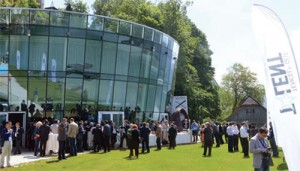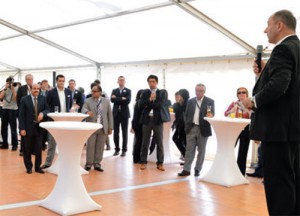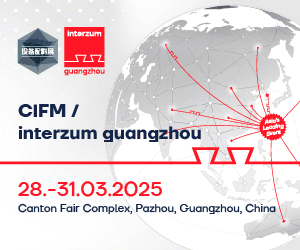 Lenzing AG is celebrating the 75th anniversary of its business operations together with 3,000 invited guests – employees, customers, business companions, politicians and partners. Several decades ago there were more than 30 viscose fiberproduction plants in Europe. Today there are only two, one of which is the headquarters of the internationally operating Lenzing Group. The Austrian company has emerged as a global player as well as the market and technology leader for man-made cellulose fibers. Lenzing fibers were once a cheap substitute for cotton. In the meantime, they are highly sought-after premium products which are valued due to the renewable raw material of wood and the environmentally-compatible production. Thanks to its innovative strength Lenzing has helped the more than 100-year-old viscose technology to reach new heights. Ultimately innovations to minimize the environmental burden of the production process have made Lenzing the best practice model in the industry. At the same time the company developed TENCEL®, a completely new and forward-looking technology which will shape the cellulose fiber industry in the coming decades. 75 years ago Lenzing manufactured 30,000 tons of fibers per year – today, the Group will soon reach a level of 900,000 tons. Innovation as the key to success
Lenzing AG is celebrating the 75th anniversary of its business operations together with 3,000 invited guests – employees, customers, business companions, politicians and partners. Several decades ago there were more than 30 viscose fiberproduction plants in Europe. Today there are only two, one of which is the headquarters of the internationally operating Lenzing Group. The Austrian company has emerged as a global player as well as the market and technology leader for man-made cellulose fibers. Lenzing fibers were once a cheap substitute for cotton. In the meantime, they are highly sought-after premium products which are valued due to the renewable raw material of wood and the environmentally-compatible production. Thanks to its innovative strength Lenzing has helped the more than 100-year-old viscose technology to reach new heights. Ultimately innovations to minimize the environmental burden of the production process have made Lenzing the best practice model in the industry. At the same time the company developed TENCEL®, a completely new and forward-looking technology which will shape the cellulose fiber industry in the coming decades. 75 years ago Lenzing manufactured 30,000 tons of fibers per year – today, the Group will soon reach a level of 900,000 tons. Innovation as the key to success
 For decades Lenzing boasted above-average expenditures in research and development, thus establishing the company as the pacemaker in the entire sector. Today the Lenzing Group is the undisputed innovation leader in the man-made cellulose fiber industry. The Lenzing Group operates the world’s leading research center for cellulose and fiber chemistry at the Lenzing site. About 170 employees work there to further develop products and production technologies. Some 1,400 patents and patent applications in 57 countries demonstrate the effectiveness and performance of this team of specialists. Research expenditures of about USD 30 mn annually underline the importance the Lenzing Group attaches to research and development. An important objective of research projects is to develop ecological production methods and sustainable products with increasingly specialized areas of application.
For decades Lenzing boasted above-average expenditures in research and development, thus establishing the company as the pacemaker in the entire sector. Today the Lenzing Group is the undisputed innovation leader in the man-made cellulose fiber industry. The Lenzing Group operates the world’s leading research center for cellulose and fiber chemistry at the Lenzing site. About 170 employees work there to further develop products and production technologies. Some 1,400 patents and patent applications in 57 countries demonstrate the effectiveness and performance of this team of specialists. Research expenditures of about USD 30 mn annually underline the importance the Lenzing Group attaches to research and development. An important objective of research projects is to develop ecological production methods and sustainable products with increasingly specialized areas of application.










